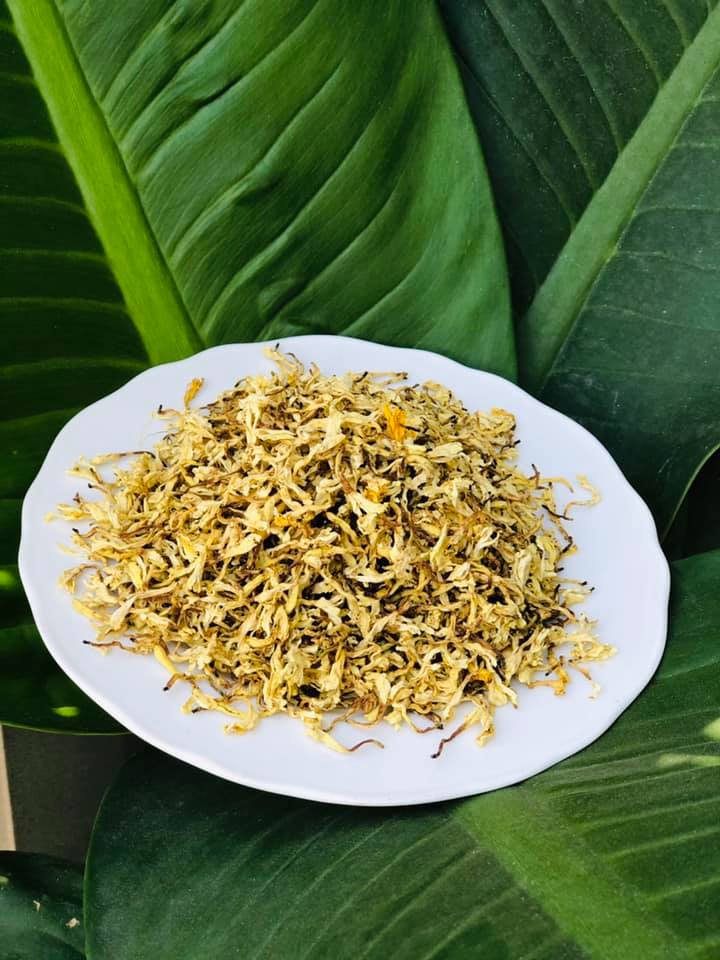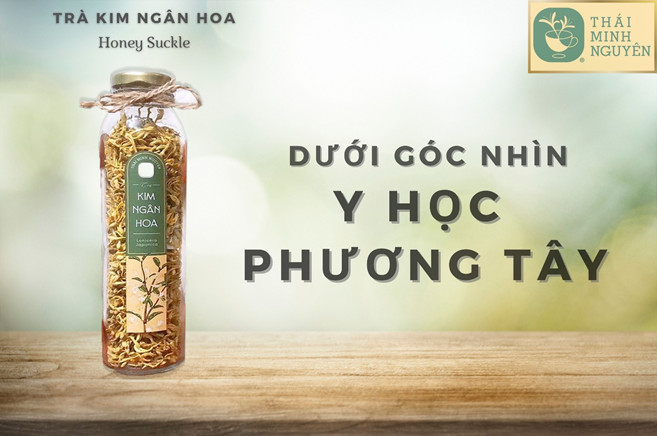Honeysuckle flower is the blossom of the Japanese honeysuckle (Lonicera japonica Thunb.), belonging to the Caprifoliaceae family. Honeysuckle flowers are also known as Japanese honeysuckle. The climbing vine of the Japanese honeysuckle is called Japanese honeysuckle vine (or simply honeysuckle vine); its effects are similar to honeysuckle flowers but slightly weaker; it has the effect of dispelling heat and reducing pain in the joints while alleviating pain. Dried honeysuckle flowers are called honeysuckle flower buds; they have the effects of nourishing blood, stopping diarrhea, treating dysentery, and promoting bowel movements with blood.
In terms of active ingredients, honeysuckle flowers contain flavonoids such as luteolin, lonicerin; tannoids and waxes… They have antiviral, antibacterial properties, anti-inflammatory, fever-reducing effects, immune function regulation, blood fat reduction, enhancement of intestinal peristalsis, increased gastric and bile secretion.
According to Traditional Chinese Medicine, honeysuckle flowers have a sweet taste and a cold nature; they enter the lung, stomach, heart, spleen, and large intestine.
Their effects include cooling heat, detoxification, nourishing blood, and stopping diarrhea. They treat acute diseases causing high fever, sore throat, cough, dry mouth, thirst, dysentery syndrome, itchy pustules, and rashes. Dosage and usage: 8 – 125g; by boiling, decoction, or steeping.
Honeysuckle is used as medicine
Detoxification to treat abscesses: treating abscesses caused by toxic heat.
Recipe 1: 20g honeysuckle flowers, 20g licorice. Decoction for oral intake. Use a suitable amount of fresh honeysuckle flowers, grind them into powder, mix with alcohol, apply around the affected area. Treats all types of toxic abscesses.
Recipe 2: 12g honeysuckle flowers (or honeysuckle vine), 2g chrysanthemum flowers, 12g dandelion, 4g raw licorice. Decoction for oral intake. Treats swollen and painful abscesses.
Recipe 3 – Clearing dampness in the intestines: 200g honeysuckle flowers, 63g job’s tears, 63g Indian bread, 16g scrophularia, 12g licorice, 125g American ginseng, 20g solomon’s seal rhizome, 125g Chinese angelica, 20g Chinese thoroughwax. Decoction for oral intake. Treats acute appendicitis or local acute appendicitis.
Dispelling heat and resolving surface symptoms: treats newly developed fever symptoms.
Recipe 1 – Silver swallow decoction: 16g honeysuckle flowers, 12g forsythia, 8g isatis root, 4g peppermint, 12g bamboo leaf, 4g licorice, 8g schizonepeta, 12g dictamnus root bark, 8g sophora flower. Decoction for oral intake. Has the effect of resolving surface symptoms and detoxifying heat. Treats diseases related to fever, chills, fever, swollen and painful lymph nodes, or acute otitis media.
Recipe 2: 20g honeysuckle flowers, 20g dandelion, 20g houttuynia cordata. Decoction for oral intake. Prevents meningitis.
Some therapeutic menus containing honeysuckle
Honeysuckle mint decoction: 30g honeysuckle flowers, 10g mint, 60g fresh reed rhizome. Infuse reed rhizome and honeysuckle for about 15 minutes, then add mint and simmer for another 3 minutes. Filter the liquid, add sugar, and drink. Suitable for individuals with heat sensitivity, fever, during the initial period of viral infections such as dengue fever, rashes, swollen lymph nodes…
Honeysuckle and chrysanthemum tea: equal amounts of honeysuckle flowers and chrysanthemum flowers, 10 – 12g each. Brew and drink as tea. Beneficial for individuals with sunstroke (sunburn, heatstroke), allergic rashes, itching.
Moist honeysuckle decoction: 30g honeysuckle flowers brewed into a decoction, add sugar to taste, boil again, divide and drink three times a day. Beneficial for patients with acute dysentery syndrome: fever, abdominal distension, vomiting, bloody stools, abdominal cramps.
Lotus seed and honeysuckle porridge: 30g honeysuckle flowers, 60g rice, 30g lotus seeds. Brew honeysuckle flowers to extract the liquid, cook porridge with clean rice and lotus seeds, adding a little sugar or salt when the porridge is cooked. Beneficial for acute diarrhea, acute dysentery, acute abscesses; acute bacterial infections causing fever, swollen lymph nodes, rashes.
Precautions: Individuals with weak spleen and stomach should avoid it; Those with acne, belonging to the Yin type, or those with watery, pale-colored pus should not consume it when it ruptures and exudes fluid.

 Tiếng Việt
Tiếng Việt


